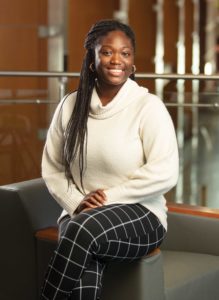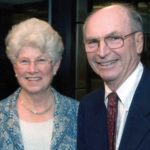Bianca Audrey Duah ’24M (MD): Realizing her dream to become a physician
Bianca Audrey Duah ’24M (MD): Realizing her dream to become a physician
Recipient of the Alice and Stewart Espey Scholarship Fund, the Dr. Robert P. Gulick ‘57M (MD) Endowed Scholarship, and the Dr. Robert F. and Isobel P. Murray Scholarship

Bianca Audrey Duah ’24M (MD)
Bianca Audrey Duah’s family came from Ghana, West Africa. She grew up in New York City and was always encouraged to become a doctor, lawyer, engineer, or nurse, as were so many of her friends and neighbors.
“As the children of immigrants, it’s often impressed upon us that these are the specific careers that will provide us social and economic mobility and security,” says Duah, a second-year medical student at the University of Rochester’s School of Medicine and Dentistry (SMD). “And, that’s what our parents want for us—to have a better life than they did.”
Visiting Ghana as a child affirmed her interest in medicine. She noticed that those in her primarily Black, Brown, and African-Caribbean neighborhood were getting the same kinds of illnesses and subsequently similar care as those in Ghana. She wanted to know why people in poorer communities suffered in the same ways.
When Duah was a teenager, people recognized her potential. In high school, she applied and was given a four-year college scholarship from The New York Times, which also gave her the opportunity to intern at the flagship newspaper the summer before college. She then attended Brown University, where she was awarded a second scholarship funded by generous donors. She left college debt-free and confident that she’d pursue medicine.
“Medical school is a distinctive experience—you can’t work, and you have to rely on others,” she says. “I owe so much to my medical school scholarship donors, who are making it possible for people like me to become physicians. Someday, I want to establish a scholarship in my name so that finances won’t be the barrier that prevents someone from realizing their academic and career goals.”
Personal insights
Duah had a lot of first-hand experience with medicine, too. Her mother and younger brother have struggled with chronic illnesses for years. As their primary caretaker, she’s gained insight into the health care system.
“When patients and their families talk about dealing with something really hard, I can relate to them,” she says. “I know what it’s like to hustle, persevere, and wait, which happens so often when you are personally dealing with illness, diagnosis, and treatment.” She adds that SMD’s biopsychosocial model resonated with her from the beginning—an approach rooted in understanding and treating the whole person.
Bloom where you are planted
“I’m from a low-income, underserved community where people stepped up to help others because they struggled, too,” she adds. For instance, Duah, who speaks Twi, did a lot of interpreting for her neighbors.
Today, she is applying the same model of service to her medical education—and she’s doing whatever she can to blossom where she is and to help others do the same. For instance, she’s SMD’s chapter president for the Student National Medical Association (SNMA), a group that is comprised of underrepresented medical students. It provides them support, advocacy, and community.
Duah’s also involved in a joint SNMA and Latino Medical School Association medical clinic held twice a month at St. Luke’s Church called Belton Health Clinic in downtown Rochester. “Black, Brown, and Latino students provide acute care, physicals, and counsel to those in the community who don’t have access, time or other resources,” she says. “It’s all free and all student-led—we are literally meeting people where they are to provide them with needed health care.”
The same students also work with Rochester’s Agape Haven of Abundance, a local organization that strives to reduce poverty by providing food security, health education, and emotional support services to disenfranchised community members. They partner to provide blood pressure screenings, COVID vaccine information, and other support to the community.
Role model for young girls
Duah wants to ensure that women, especially Black and Brown women, feel like they have a place in medicine and in the professional community. To help do this, Duah’s part of a pipeline project at the Cheryl Speranza Leadership Institute at Our Lady of Mercy, an all-girls private Catholic high school in Rochester. The project offers a small cohort of underrepresented girls an opportunity to attend the high school free of charge.
“In addition to their core high school curriculum, the girls also get leadership training, connected with various support services, and plugged in the pre-college activities like ones we have at SMD and on the River Campus,” she says. “They get exposed to research and gain experiences they might not have had otherwise. As a mentor in the program, I want them to see that they can be a Black woman and a medical student—that they can be whatever they want to be.”
Looking ahead
Right now, Duah is drawn to a career in orthopaedic surgery, a traditionally white, male- dominated field. That isn’t stopping her though. This summer, she’s learning all she can about it. She’s currently working with Rishi Balkissoon, MD, an orthopaedic surgeon at URMC, through the Nth Dimensions program, which focuses on increasing the number of Black and Brown physicians in orthopedic surgery, radiology and dermatology. She shadows Dr. Balkissoon in clinic and in the operating room and conducts research with him.
“Bianca’s level of maturity and perspective makes her a certain shining star as a future physician,” says Balkissoon. “She has a passion for medicine and patient care and an excitement for learning that elevates those around her. I’m hopeful that she maintains her interest in orthopaedic surgery, as I would be pleased to see her as a future colleague.”
In addition, Duah has also shadowed physicians at Wilmot Cancer Institute, where she learned more about the field of oncology as part of the American Society of Clinical Oncology’s summer internship program. She’s struck by the amount of attention they give her, and how focused they are on their patients and on teaching her and others at the same time.
That’s not all. Duah is also interested in narrative medicine, an approach that uses people’s narratives in clinical practice, research, and education as a way to promote healing. “Narrative medicine is about looking through the lenses of patients and their families to understand what it’s like to be sick, go through treatment, and be on the other side of MyChart.” Narrative medicine, she adds, is aligned with the biopsychosocial model and has the potential to influence the quality of patient care.
When asked where she wants to be in five years, Duah replies, “I hope to be in my second year of residency, learning to be a good doctor, and contributing to the health, happiness, and well-being of my patients.”

“My husband, Dr. Bob Gulick, was so dedicated to his patients and to our family. I’m passionate about volunteerism, and Bob always supported me and shared his experiences with me. It is with great pride that this scholarship for a medical student supports our goals. Because Bianca is not burdened with debt, she is able to pursue her interests—such as conducting research in her future specialty and creating a mentorship program—beyond the challenging demands of a medical student.”
– Mary Gulick
Consider establishing or supporting a scholarship and help us continue to train exemplary leaders in medicine, regardless of their financial background. Your gift can change someone’s life. Contact Melissa Head, executive director of URMC academic programs, for more information.
—Kristine Kappel Thompson, updated February 2022
